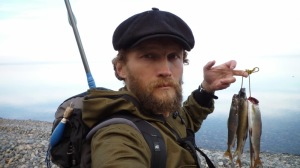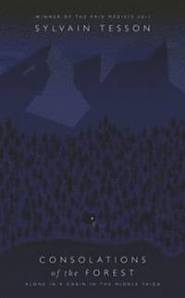Consolations of the Forest
Sylvain Tesson “Consolations of the Forest: Alone in a Cabin in the Middle Taiga”
Allen Lane, 2013

In Consolations of the Forest, Sylvain Tesson explains how he found a radical solution to his need for freedom, one as ancient as the experiences of the hermits of old Russia: he decided to lock himself alone in a cabin in the middle taiga, on the shores of Baikal, for six months. From February to July 2010, he lived in silence, solitude, and cold. His cabin, built by Soviet geologists in the Brezhnev years, is a cube of logs three meters by three meters, heated by a cast iron skillet, six-day walk from the nearest village and hundreds of miles of track.
To live isolated from the world while retaining one’s sanity requires a routine, Tesson discovered. In the morning, he would read, write, smoke, or draw, and then devoted hours to cutting the wood, shoveling snow, and fishing. Emotionally, these months proved a challenge, and the loneliness was crippling. Tesson found in paper a valuable confidant, the notebook, a polite companion. Noting carefully, almost daily, his impressions of the silence, his struggles to survive in a hostile nature, his despair, his doubts, but also its moments of ecstasy, inner peace and harmony with nature, Sylvain Tesson shares with us an extraordinary experience.

Writer, journalist and traveler, Sylvain Tesson was born in 1972. After a world tour by bicycle, he developed a passion for Central Asia, and has travelled tirelessly since 1997. He came to prominence in 2004 with a remarkable travelogue, Axis of Wolf (Robert Laffont). Editions Gallimard have already published his A Life of a Mouthful (2009) and, with Thomas Goisque and Bertrand de Miollis, High Voltage (2009). In 2009 he won the Prix Goncourt for A Life of a Mouthful, and in 2011 won the Prix Médicis for non-fiction for Consolations of the Forest: Alone in Siberia.

“Between February and July 2010, Sylvain Tesson lived alone in a remote Siberian cabin on the shore of Baikal, the world’s biggest freshwater lake. He had six shopping trolleys’ worth of pasta; enough vodka to get regularly drunk; a stack of books that included volumes by Nietzsche, Sade, Camus and Shakespeare; mountaineering equipment, and not much else. “Freedom is always available,” reads one of the epigraphs that start the book. “One need only pay the price for it.”
It’s hard to imagine a more macho spiritual retreat. Tesson chops wood in Arctic temperatures, drills through the thick crust of the frozen lake for water, and spends hours watching the changing light. “I who used to pounce on every second to make it surrender and give up its all,” he writes, “– I am learning the art of contemplation. The best way to observe a monastic calm is to find oneself obliged to do so.” There’s a deep sense of relief when spring comes, and with it seals, ducks, insects, bears and drowsing in hammocks.

Tesson has already crammed a lot into his 41 years. He’s won a major short story award, the Prix Goncourt, and published half a dozen adventure travelogues in his native France. “The alchemy of travel thickens seconds,” he says, but it also made him “frantic with restlessness” and his trips “finished in track races against the hours”. Now he wants space, silence and solitude, to appreciate the least flashy instances of beauty. It works: at one point he catches himself rhapsodising about dust, and comments, “March is going to be a long month”.
For anyone who secretly dreams of a life that’s both simpler and more physically demanding – and there are a lot of those people, if the current craze for a certain sort of dystopian fiction is anything to go by – Tesson’s descriptions of bruised-looking Siberian sunsets and Baikal in the rain (“a coal-black flannel pricked by a deluge of needles”) are a draft of cool air. He conjures villages that “smoke at the foot of hills”, and traces the gold-and-turquoise glow of the cracks in the lake’s frozen mantle, which look like “photos of stardust clouds” as they’re hit by the sun. Reading a travelogue may be a poor substitute for travel, but Tesson’s precise, meditative prose does a good job of slowing the pulse.
When he’s not admiring the view or struggling through blizzards, Tesson wrestles with life’s big questions, making grand pronouncements, such as “the hermit absorbs the universe” and “all dialogue is battle”. For the most part, he comes across as a classic Übermensch – smoking cigars on mountain peaks and sleeping rough with one hand on a flare gun to fend off bears – but we occasionally get to see a wounded man underneath the heroics.
“The courageous course would be to face things,” he reflects on one rainy evening: “What am I? Contemptible, frightened by the world.” The following month, his girlfriend breaks up with him via a text message to his satellite phone. “Everything has collapsed,” he writes, and cries into the fur of his dogs. “Time doesn’t hand out second chances, and me, I hared off to the forest, leaving her behind.”
While it would be easy to mock some of Tesson’s haughtiest moments as typical Parisian high-mindedness, the fact he’s so unabashed about his soul-searching is what sets the book apart from the typical 21st-century memoir. He seems to belong to an earlier era of swashbuckling adventurers and public intellectuals who were out to change the world. There’s humour and humanity here, but also a serious attempt to answer the question, “How should a person live?”
“The Guardian”, 1 June 2013
http://www.theguardian.com/books/2013/jun/01/consolations-forest-sylvain-tesson-review1

“I thought I’d rip through this book. But it’s not something you want to read fast. Tesson, who I came to like more and more, is trying to rearrange his relationship with time. Being alone, miles from anywhere, encourages him to sit still and watch things. ‘I spend two hours in the position of Dr Gachet as painted by Van Gogh,’ he tells us. He looks at birds. He’s constantly aware of animals. Bears, wolves. He ponders the Russian, and also the Slavic, soul. Compared to us cheese-paring, bean-counting Westerners, Russians are, in some ways, awesome. It’s ‘a nation that sends rockets into space and where people fight off wolves with stones’.
He tells us some things we already know, but which are nevertheless welcome thoughts — being in a cold place makes you glad when you’re warm; time passes slowly sometimes, and fast at other times; when you’re lonely, you look for the best in people, and enjoy their company. He’s on the edge of Lake Baikal, which is mostly frozen, and people who live on a frozen lake are, to us, quite odd. One guy approves of Stalin and thinks ‘the French are homosexuals’. Tesson came to the woods to escape the barbarity of the modern world. But the woods, with their fiendish stag-traps and mink-hunters, are pretty barbaric too.

What are you, anyway, when you become a hermit? In one way, you’re disengaging from life. But in another, you’re pressing your face deeper into the stuff of life — you become feral, brutal, direct. You come to see that civilisation requires a form of acting. You pull fish out of the lake and kill them. You become bear-aware. You look for tracks in the snow. Tesson thinks, very articulately, about what it means to disengage from society. He thinks about hippies (they wanted freedom, rather than nature) and the Arab Spring (they want consumer durables). Reading Lady Chatterley’s Lover, as a hermit, you see it not as an erotic work but a book about the destruction of the environment.
So: you go to the middle of nowhere, and find out that, because you’re there, it’s the centre of the world. You get close to nature, and you discover that it’s much easier to romanticise from a distance. Deciding not to bring flowers to a woman, he explains: ‘Flowers are obscene sex organs.’ Living in a log cabin, he decides, is reactionary. People don’t plan revolutions from log cabins. They’re much more preoccupied with getting through the day. Tesson thinks about history. When you get down to it, he says, ‘men replace trees. One day, history turns around, and the trees grow back.’
“The Spectator “ 15 June 2013 http://www.spectator.co.uk/books/8931091/consolations-of-the-forest-by-sylvain-tesson-review/

“For an intentional hermit, wilderness trekker Sylvain Tesson has a surprising amount of company during his six-month retreat in Siberia. Though he deliberately exiles himself to a remote one-room cabin for solitary contemplation, he ends up developing new relationships with his environment, its animals, and its human population as well. In The Consolations of the Forest: Alone in a Cabin on the Siberian Taiga, Tesson shares the detailed journal of his days in what should be the bleakest corner of the planet, but which turns out to be a rich and varied experience.
Winner of the Prix Medicis for nonfiction in his native France, this English translation of Tesson’s Dans les Forets de Siberie gives the prolific travel writer an expanded audience. Readers from across the globe are invited to join the intrepid traveler as he ventures into the subarctic realms with only his books, his vodka, and a sustaining supply of pasta and Tabasco sauce. On the shores of Lake Baikal, he sets out to conquer an ambitious reading list that includes Nietzsche, Sade, Camus, and Shakespeare. After all, he has six months to fill.
The time fills more quickly than either Tesson or his readers expect. First, there are the basics of survival. (As the Zen proverb says, “Before enlightenment, chop wood, carry water.”) Then, there are the visitors. The daily conversation with a titmouse at the windowsill and the constant lookout for bears occupy many hours. So, too, do the surprisingly frequent visits from Tesson’s Russian counterparts, who live in the forest to safeguard the wildlife against the threat of poachers. Tesson never knows when a “neighbor” from seventy-five miles away will crash through his door. Sausages and seal meat are slung on the table, vodka is passed around, and raucous conversation flies across the room at top speed and volume. And then, just as suddenly as they appear, the visitors take off. It’s contrasts like these, between solitude and companionship, that make Tesson’s story fascinating.

Tesson’s writing is most evocative when he concentrates on the tangible details of his days—his trek “over sheets of lunar ice that resemble huge jellyfish veined with turquoise,” for example. These passages create vivid images in the reader’s mind, although Tesson occasionally gets carried away by the metaphorical possibilities, as when he imagines “the melancholy of forests, the joy of mountain torrents, the hesitation of bogs, the strict severity of peaks, the aristocratic frivolity of lapping waves.”
With The Consolations of the Forest, Tesson adds a modern voice to the rich literary history of contemplative nature writers like Thoreau and Emerson. Tesson reaches few conclusions, but rather asks readers to accompany him as he explores the question of people’s relationship to nature and each other.”
https://www.forewordreviews.com/reviews/the-consolations-of-the-forest/
Leave a comment